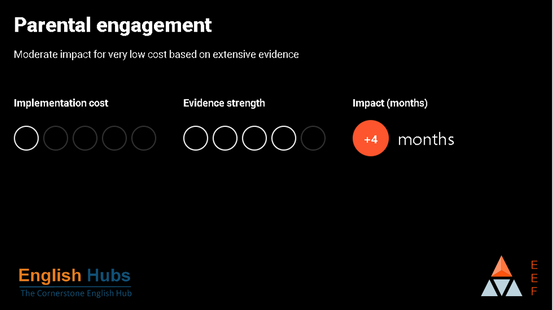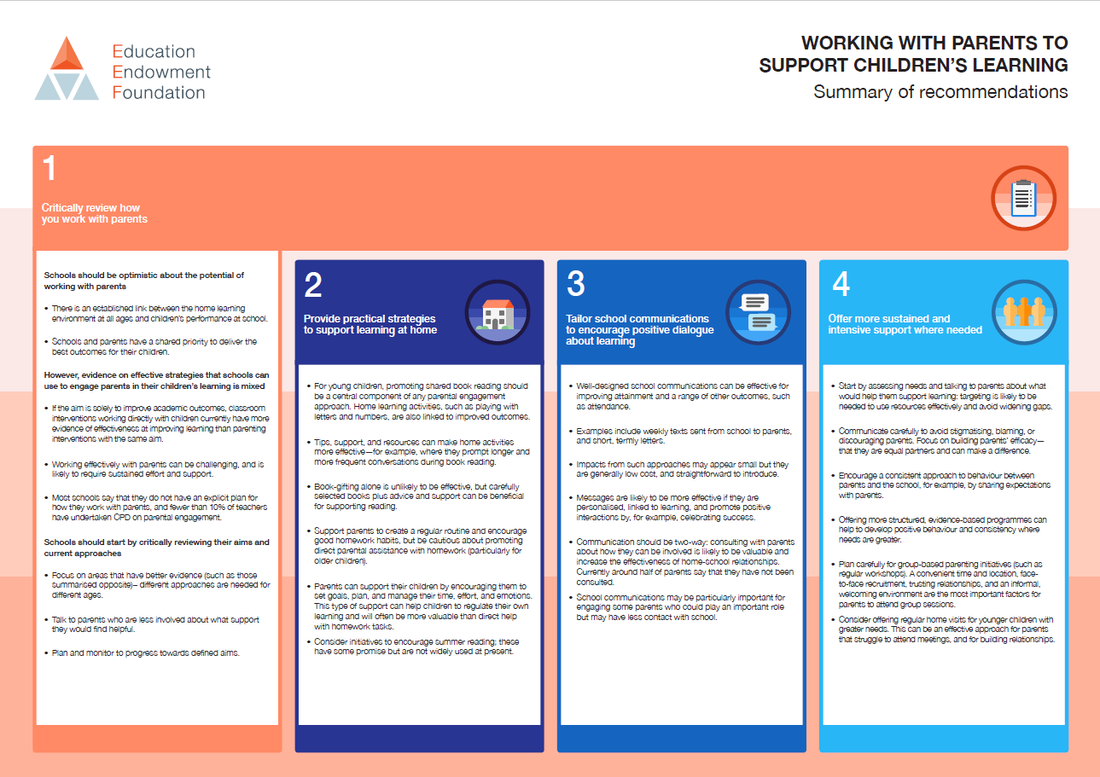|
26/5/2022 0 Comments Winning Them Over: Overcoming Struggles in Parent Engagement | Cornerstone English HubMatthew Pitts, Deputy Head of School & English Hub Lead, Cornerstone Academy Trust led this fifth network event, “Winning Them Over: Overcoming Struggles in Parent Engagement” to provide guidance for teachers in the context of reading and literacy. Put simply, there’s no perfect solution to winning over parents. Any parent body is made up of human beings who inevitably do not fit into boxes. It’s a case of doing the best you can. Sometimes in education we think we can’t “crack it” and want to impact the whole class or cohort and so we deprioritise. But by impacting some key parental engagement, teachers can reduce the number of “on watch” children who are more vulnerable to drops in progress and gaps in their knowledge. Research shows that parental involvement can still have an impact. The benefits are clear for those children whose parents are engaged in their schooling and spend time with their child at home going through their classwork and reading with them. “Parental involvement in the form of ‘at-home good parenting’ has a significant positive effect on children’s achievement and adjustment even after all other factors shaping attainment have been taken out of the equation. In the primary age range the impact caused by different levels of parental involvement is much bigger than differences associated with variations in the quality of schools. The scale of the impact is evident across all social classes and all ethnic groups.” Source: The Impact of Parental Involvement, Parental Support and Family Education on Pupil Achievement and Adjustment: A Literature Review | C. Desforges and A. Abouchaar (2003) The stablishing factor is for a child to allow for transitions between teachers and also when teaching and learning in the classroom is not as good as it could be due to staff absence and struggling teachers. Ultimately children need to be educationally resilient. But it is important to be realistic as teachers are never going to engage all parents.  Educational Endowment Foundation (EEF) research undertakes what it terms “meta-analysis” of all the current analysis that it distils into simple takeaway points. Their research into parental engagement was based on 97 different international studies in ten different countries. Strong evidence showed that those schools working on parental engagement demonstrated a four-month educational improvement across a child’s career. One advantage is that the implementation cost of many parental engagement strategies is very low. Low budget high reward. It’s a question of using what you have in place, i.e. school infrastructures. Research shows that impact can vary at different stages with the highest impact in Early Years settings and this impact gradually lessens as the child gets older. This is to be expected given children become more secure in themselves as learners. However, whilst children might make rapid progress, they are still dependent on adults in every aspect of their lives. The most strongly seen impact in reading is home reading, which does not require huge technical knowledge. There are nevertheless the inevitable “tussles and tensions” in parental engagement. “Teachers often lack confidence and knowledge to work with parents, and schools do not always recognise or value the ways in which parents are already engaged with children’s learning. Furthermore, schools generally do not collect sufficient data on their own interventions, particularly relating to the impact on academic outcomes. For their parents face numerous logistical barriers to further engagement, including costs, times and transport.” Source: Review of the Best Practice in Parental Engagement | Goodall and Varhous 2010  When considering interventions, the key advice is for teachers to consider: How do you know that’s helpful to parents? So, what are the barriers for parental engagement? Research shows there are three types of barriers: 1. Physical and practical – time of meetings 2. Social and demographics - not attending parental training, parents living in poverty. 3.Stigma – the school and education might not be valued. To consider how to avoid this failure for parents What about those schools who have had a successful impact? Research shows there are five areas for success: 1. Take a whole school approach. 2. Training for staff. 3. Identify parents’ needs. 4. Outward-facing ethos. 5. Digital technologies. Source: Review of Best Practice in Parental Engagement | Goodall and Vorhaus 2010 What methods can schools focus on? Research demonstrates four processes: 1. Spaces 2. Online platforms 3. Communication methods 4. Relationships But above all, it is essential that schools know their parental body: 1. What makes them tick? 2. What are their struggles? 3. Where do they hang out? (social media!) Cornerstone found they had greater take-up for online meetings and duly uploaded recorded meetings to Vimeo for parents to watch when they wish. Too often, Headteachers do not speak the same language as parents. Show parents what’s going on in the classroom - don’t tell. Schools can make the classroom more transparent by inviting parents to: 1. Watch a lesson 2. Join in virtually 3. Learn to coach Take a moment to think and “critically review how you work with parents.” And how can schools guide parents to engage with their children at home? Certainly, to foster a love of reading and to guide how to read more efficiently. Schools could demonstrate by reading a few paragraphs of a book and then discussing the pages. Film it! Invite parents into school and show them with a live child and teacher/Teaching Assistant reading together. Do the best you can with what you have. Thank you to Matt and Cornerstone Academy Trust for this thoughtful and pragmatic winning approach to Overcoming Struggles in Parent Engagement. Report by Jude Owens, PA to the SWIFT Executive Team
0 Comments
Your comment will be posted after it is approved.
Leave a Reply. |
SWIFT News
|
SPONSORED BY
Join us, be a part of our SWIFT community |
© COPYRIGHT 2022 SOUTH WEST INSTITUTE FOR TEACHING SWIFT. ALL RIGHTS RESERVED | Website by brightblueC
VIEW OUR PRIVACY NOTICES | VIEW OUR COURSE T&CS
VIEW OUR PRIVACY NOTICES | VIEW OUR COURSE T&CS




 RSS Feed
RSS Feed





